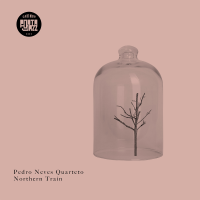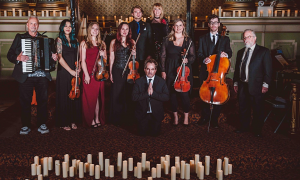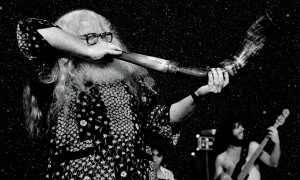Home » Jazz Articles » From the Inside Out » Back in the Day, Around the World
Back in the Day, Around the World

 Brooklyn Funk Essentials
Brooklyn Funk EssentialsStay Good
Dorado Records
2019
Back in the day, jazz bands like Roy Ayers' Ubiquity and soul bands like the Ohio Players played more than jazz and soul. Jazz and soul were their main ingredient, but only one ingredient among others stirred in from R&B, funk, pop, Latin and other music. You might have heard them on different radio stations, but they shared that same groove back in the day. Somehow, Brooklyn Funk Essentials have stayed back in the day and stepped it forward into a new old school sound on Stay Good. "In many ways," muses Swedish bassist and producer Lati Kronlund, "Brooklyn Funk Essentials has morphed into something completely new. But we're all committed to stay good, to continue developing and improving as musicians."
Stay Good brings Brooklyn Funk Essentials (BFE) full circle. Kronlund first teamed with London-based singer-songwriter Alison Limerick on "Where Love Lives," a 1990 danceclub hit so successful that it prompted Kronlund to move to Manhattan and put together the band that eventually became BFE. In 2016, Limerick accepted Kronlund's invitation to sing at a BFE gig in London, and then the band's invitation to join them in the studio to record Stay Good.
"Stay Good" kicks things off with just the sneaky, snakey rhythm track, then blossoms like a flower into a more colorful and Prince-like funk sound. Falsetto vocals flutter and sing, "I'm gonna do it, I'm gonna do it..." as bassist Kronlund and drummer Roma Hux Nettermalm illustrate cool dexterity in the international language of funk. "Stay Good" honors the classic soul and funk sound of the 1970s without getting stuck back there; it would have filled a dancefloor decades ago and could fill one tonight.
Stay Good doesn't forget the instrumental jam to shake your jelly. Saxophonist Anna Brooks pokes out the sticky melody to "Bahabana," which sounds like the George Duke band playing hard bop in his chatty electric funk style, and comes out swinging again with Kronlund in "Y Todavia La Quiero" upon Nettermalm's New Orleans shuffle drumbeat, slippery and hard to nail down but so rock solid.
Sure enough, Roy Ayers himself pops up in in the shimmering "Breeze on Me," a ballad so steamy that Ayers' vibes and Iwan Van Hetten's brooding trumpet blues seem to rise up like shimmering heatwaves from its luscious mix.
BFE shuts Stay Good down with a glistening, soulful update of "Where Love Lives," Kronlund and Limerick's first tune together, to bring their funk full circle—back to the day.
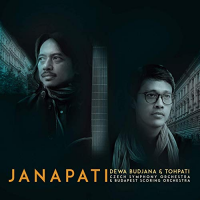 Dewa Budjana & Tohpati
Dewa Budjana & TohpatiJanapati
POS Entertainment Indonesia
2019
Janapati combines the names of two of the best guitarists (jazz, rock, jazz-rock fusion, world, and any/every other music you've got) from Indonesia, Dewa Budjana and Tohpati Ario Hutomo (Tohpati). As leaders of their own bands or as contributors to other recordings, the two have appeared on more than fifty combined releases, many for the globetrotting MoonJune Records label, and they suggest in their joint liner notes: "Long enough friendship in music makes us more familiar with each other and of course this makes it easy for both of us to create joint works."
Janapati features these guitarists in the exquisite musical company of the Budapest Scoring Symphonic Orchestra and the Czech Symphony Orchestra, with bassist Adhitiya Pratama and drummer Demas Narawangsa serving on several tracks as rhythmic linchpins between the guitarists and orchestras.
As you'd anticipate from its symphonic surroundings, Janapati sounds like the evocative score or soundtrack to a movie you haven't seen yet. Their "Children Songs" medley dances like twinkling pixies in a scene from The Nutcracker ballet, including a delightful passage that suggests "Dradle" played on banjo that shifts into waltz time, twirling all the strings in beautiful synchronous circles.
Janapati was originally conceived and planned under the title Duo and features twin electric/acoustic versions of "Duology." "Duology Acoustic Version" brings down the curtain in shimmering and soft nylon virtuosity, but its electric twin "Duology" screams the loudest and rocks the hardest. Twin guitar chords slam into your ear, peel away and then shift into zig-zag harmonized riffing like The Allman Brothers in race cars, while the rhythm section pounds out the four on the floor, hard-driving tempo. It's jazz, rock, global and powerful.
You can say the same about the opening, title track. "Janapati" opens in an orchestral swirl of musical cinema that shifts your focus by panning (like a camera) from sound to sound, leading your ears back to twin guitars woven so tightly with the orchestra that it's genuinely difficult to distinguish their separate sounds.
 Jazz at Lincoln Center Orchestra with Wynton Marsalis
Jazz at Lincoln Center Orchestra with Wynton MarsalisBig Band Holidays II
Blue Engine Records
2019
Jazz at Lincoln Center Big Band Holiday concerts, featuring the JALC Orchestra with Managing and Artistic Director Wynton Marsalis and guests, have been a relatively modern addition to New York City holiday jazz traditions. Big Band Holidays II presents the second set of live recordings from these concerts beginning from 2015, the year that the JALC Orchestra released their first Big Band Holidays set on their own Blue Engine Records label.
"Christmas brings the best and worst out of people," explains trombonist Chris Crenshaw in his booklet notes, "and we bring those feelings to fruition when we perform on the road and in New York City."
The most enduring snapshot from Holidays II is most likely Aretha Franklin's glorious "O Tannenbaum," first in English and then in the original German, accompanied only by her own piano—a rapturous snapshot of the regal gospel sound that was rarely far from the Queen of Soul's vocals.
How good is the JALC Orchestra on Holidays II? So good that Director Marsalis might not even be its best trumpet player. That honor on this set most likely goes to Marcus Printup, who opens the 19th- century spiritual "Rise Up, Shepherd, and Follow" with the song of a heralding angel, downshifts into the grinding blues sound of "Old Man River," then swings out a mid-song solo as heavy as an elephant bearing an Oriental king. Marsalis' solos in the cheery opener certainly help keep "It's the Most Wonderful Time of the Year" bright, and his blasts through several unaccompanied passages of Claude Thornhill's "Snowfall" encapsulate the stylish celebratory swing of his native New Orleans.
Pianist Dan Nimmer rolls out the "Silent Night" finale as a rollicking stroll, leading Denzal Sinclaire into a gentleman's blues vocal that bows toward Nat King Cole, Lou Rawls, and Jimmy Witherspoon, and shepherding the Orchestra into the powerhouse closing "Sleep in heavenly peace" refrain.
Holidays II captures arrangements and performances vibrant enough to overcome the familiarity of these holiday and gospel traditionals. Whether it's February or June or December, it's simply fantastic music.
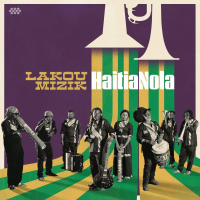 Lakou Mizik
Lakou MizikHaitiaNola
Cumbancha Records
2019
HaitiaNola is proof that lemonade is possible when life hands you lemons. Ten-piece roots music troupe Lakou Mizik came together to help reassemble Haiti's musical culture in the wake of the 2010 earthquake. They recorded their debut in 2016 and then embarked on an international tour, including a performance at the 2017 New Orleans Jazz & Heritage Festival which was so powerful that they were invited to return the following year.
During that 2018 Festival, they recorded sections of HaitiaNola at the Preservation Hall Jazz Band's private facility and other studios in and around New Orleans, and the rest in Haiti. "There would be no New Orleans music without Haiti," explains PHJB Director Ben Jaffe. "It's been one of the most important influences on New Orleans going back 200 years."
(Historical aside: When the Haitian revolution ended in 1809, thousands of freed black, enslaved black, and white people fled the newly independent nation into the nearest French colony, doubling the population of New Orleans in just a few months.)
With "Renmen (Love)," HaitiaNola's opening track, The Preservation Hall band opens the bridge from Haiti to New Orleans through percussion, rhythm and (call and response) vocals, and brass and reeds that sing out the sound of Big Easy street musicians on a swinging march. This Haitian twist on the familiar "Iko Kreyòl" swims through instrumental and vocal lines that criss-cross to create new currents of melody and rhythm, and slips into the big brass sound of "Sa Na Kenbe (What Will We Keep)," which features Cyril Neville, the youngest member of another New Orleans musical institution—Neville Brothers.
HaitiaNola crescendos in "Lakou Dogwe (Temple Ritual)," a solemn, almost liturgical, melody and rhythm that perfectly dovetails with the primal force of the blues screaming from Anders Osborne's brittle, crunchy electric guitar sound to create a powerful wall of blue voodoo.
Trombone Shorty blasts the tempo from friendly into frantic for the piping hot "Pistach Griye (Grilled Peanuts)." It's tempting to try to figure out which parts of this singular sound come from "New Orleans jazz" and "Haitian traditional" music, but the point of HaitiaNola is that they're both within and next to each other.
 Randy Napoleon
Randy NapoleonCommon Tones
Detroit Music Factory
2019
Randy Napoleon may represent the new school of Detroit guitar players emerging from the lineage of Kenny Burrell and (Motown) Funk Brothers Dennis Coffey and Joe Messina but his approach and sound on Common Tones are old school for sure. His fifth set as a leader (on the Detroit Music Factory label) collaborates across four generations of Michigan jazz musicians and sounds and feels like an old-school jazz conversation, as if Napoleon and friends are playing directly to each other, and to you.
This meets the standard of Napoleon's description of jazz: "When you are playing jazz, it is a conversation that moves at lightning speed. There is no time to think. It has to be reflexive, an ingrained response."
Common Tones extends beyond the traditional jazz repertoire but remains a jazz purist's dream. "Common Tones" and "Where It Ends," two Napoleon originals, fully channel the strong and soulful sound of Detroit's favorite guitar son Burrell, and its cheerful glide through "Wouldn't It Be Nice," which mines from The Beach Boys' vocal classic a vein of deep, shining, and rock-solid jazz, opens this set like a sunny smile.
Trombone player Drew Kilpela finds it first, and then drummer Nicholas Bracewell kicks up the spicy-hot New Orleans jazz funk in Napoleon's original "You've Got To Hang On," a great title because his guitar leads the ensemble through its long melodic lines.
The leader's tight and accurate attack in "I Married An Angel" (from the Rogers and Hart songbook) sounds like he's threading guitar notes through the eye of a needle, yet leaves plenty of space for drummer Nick Bracewell and bassist Louie Leager to dish out their groove stew, too and his duet with guitarist Jocelyn Gould on "The Song is You" (Hammerstein/Kern) soars from its very start in a solid but supple sound suggesting overdubbed Joe Pass playing both parts at once.
Many of the musicians Napoleon features on Common Tones are former students. "This record is dedicated to my teachers, and to my students," his notes explain. "We are connected through the music."
 Chris Trinidad
Chris TrinidadChris Trinidad y Con Todo
Iridium Records
2019
You might think that Chris Trinidad would have a hard time figuring out his next move after Chris Trinidad: Chris Trinidad's Chant Triptych II (2018, Iridium), an instrumental album based on traditional Gregorian chants but played on instruments from India, the Balkans and other cultures.
But Trinidad eventually landed upon this recipe: Take one Filipino-Canadian bassist. Add songs he wrote on cruise ships in the Caribbean. Marinate for 19 years. Combine with one Mexican-American Grammy-winning arranger of salsa music.
The above may be the simplest and best way to explain this magical follow-up Chris Trinidad y Con Todo, which this San Francisco Bay area bassist, educator and choral conductor collaboratively assembled with pianist- arranger Christian Tumalan (who also co-leads the Pacific Mambo Orchestra with trumpeter Steffen Kuehn). Their combined musicianship helps create a colorful sound—a postcard from the Caribbean Jazz Project enjoying a hot Afro-Cuban weekend jaunt to Havana.
The playful and prowling "Tigres Blancos y Elefantes Grises (White Tigers and Grey Elephants)" was first a jazz waltz until Trinidad asked Tumalan to arrange it as an Afro-Cuban bembe; this versions suggests something written or arranged by pianist Arturo O'Farrill because it seems to set such a perfect, full but uncluttered, table for tenor saxophonist Tony Peebles to graze through in his solo.
Tumalan's vibrant arrangement of "Hasta Entonces, Mi Amigo (Until Then, My Friend)" changes its opening songo into a charanga with lush and lively rhythms and melodies. "I wrote this song over two years while listening to copious amounts of jazz by Ralph Towner, Pat Metheny, and Roy Haynes," Trinidad's notes explain.
Tumalan also consistently steals this show with the vision, passion, and execution of his piano solos. He is utterly brilliant in "Hasta Enconces, Mi Amigo" and in "Principios De La Causalidad (The Principles of Causality)," which should have come with its own handle so you could grab on as it races through your ears.
"Llegando A La Razón (Arrive to Reason)" steps out more tempered and deliberate, like a Satie ballet piece, with trumpeter Bill Ortiz projecting such an emotionally accurate sound for its mood—vulnerable, trembling in vibrato and whispering Sketches of Spain.
Tracks and Personnel:
Stay Good
Tracks: Stay Good; Ain't Nothing; No Strings; Watcha Want From Me; Miss Mess; Keep the Love; Funk Ain't Ova; Breeze on Me; Bahabana; Y Todavia La Quiero; Steps; Where Love Lives.
Personnel: Anna Brooks: saxophones, vocals; Desmond Foster: guitar, lead vocals; Jonah Gold: live sounds, studio dubs; Lati Kronlund: bass, keyboards; Alison Limerick: lead vocals; Roma Hux Nettermalm: drums, percussion; Iwan Van Hetten: trumpet, keyboards, vocals; Roy Ayers; vibraphone; Leena Conquest: vocals.
Janapati
Tracks: Janapati; Rainy Days; Ratu Kanya; Samudera Pasai; D Romance; Bermain; Duology; Children Songs; Rahadi's; Duology Acoustic Version.
Personnel: Dewa Budjana: acoustic guitar, semi-acoustic guitar, electric guitar; Tohpati: classical guitar, electric guitar; Adhitiya Pratama: bass; Demas Narawangsa: drums; Budapest Scoring Symphonic Orchestra; Czech Symphony Orchestra.
Big Band Holidays II
Tracks: It's the Most Wonderful Time of the Year; Cool Yule (featuring Catherine Russell); We Three Kings (featuring Denzal Sinclaire); O Tannenbaum (featuring Aretha Franklin); Rise Up, Shepherd, and Follow; (Everybody's Waitin' for) The Man with the Bag (featuring Veronica Swift); What Will Santa Claus Say? (When He Finds Everybody Swingin') (featuring Catherine Russell); Brazilian Sleigh Bells; Silver Bells (featuring Catherine Russell); Snowfall; Silent Night (featuring Denzal Sinclaire).
Personnel: Sherman Irby: alto and soprano saxophones, clarinet, flute; Ted Nash: alto and soprano saxophones, clarinet, flute; Victor Goines: tenor and soprano saxophones, clarinet; Walter Blanding: tenor saxophone, clarinet, shaker; Paul Nedzela: baritone and soprano saxophones, bass clarinet; Camille Thurman: tenor and soprano saxophones; Marcus Printup: trumpet; Kenny Rampton: trumpet; Wynton Marsalis: trumpet; Ryan Kisor: trumpet; Greg Gisbert: trumpet; Bruce Harris: trumpet; Tatum Greenblatt: trumpet; Vincent Gardner: trombone; Chris Crenshaw: trombone; Elliot Mason: trombone; Sam Chess: trombone; Eric Miller: trombone; Dan Nimmer: piano; Carlos Henriquez: bass; Ali Jackson: drums; Marion Felder: drums; Charles Goold: drums; Aretha Franklin: vocals and piano; Catherine Russell: vocals; Audrey Shakir: vocals; Denzal Sinclaire: vocals; Veronica Swift: vocals; James Chirillo: guitar.
HaitiaNola
Tracks: Renmen (Love); Pistach Griye (Grilled Peanuts); La Fanmi (The Family); Kay Granpa (Grandfather's House); Loumandja; Lakou Dogwe (Temple Ritual); Azaka Vini We'n (Azaka Came To See Us); Iko Kreyòl; Sa Na Kenbe (What Will We Keep); Rasanbleman (Come Together); Grann (Grandmother); Manman Lavi (Mother of Life); Bouyon Lakou (Lakou Gumbo); Mizik Sa Yo (These Songs).
Personnel: Lakou Mizik: Jonas Attis: vocals; Beniste Belony: accordion, chorus; Saida Bellamour: chorus, vocals; James Carrier: chorus, percussion; Peterson Joseph: chorus, drums, horn; Junior Lamarre: chorus, bass; Louis Leslie "Sanba Zao" Marcelin: drums, guitar, percussion, vocals; Samuel Priviose: chorus, vocals; Nadine Remy: vocals; Steve Valcourt: guitar, vocals. Guests 79rs Gang; Troy "Trombone Shorty" Andrews: trombone; Tarriona "Tank" Ball: vocals; Jermaine Bossier: vocals; Romeo R. Bougere: percussion, vocals; Win Butler: dubs, percussion; Régine Chassagne: vocals; Jon Cleary: guitar, piano; Charlie Gabriel: clarinet, tenor sax; Julian Gosin: trumpet; Walter Harris: drums; Eric Heigle: bass, chord organ, drums, farfisa organ, guitar, keyboards, percussion, programming, synthesizer, synthesizer bass; Ashton Hines: trumpet; Jimmy Horn: guitar; Marcus Hubbard: trumpet; Ben Jaffe: bass, tuba; King James: vocals; Darryl Johnson: vocals; Ronell Johnson: trombone; Raja Kassis: guitar; Branden Lewis: trumpet; Lost Bayou Ramblers; Damas "Fanfan" Louis: drums; Clint Maedgen: tenor sax; Leyla McCalla: cello, vocals; André Michot: accordion; Louis Michot: fiddle; Cyril Neville: vocals; Anders Osborne: guitar; Corey Peyton: trombone; Jeremy Phipps: trombone; Preservation Hall Jazz Band; Paul Robertson: trombone; Kyle Roussell: keyboards, piano; Logan Schutts: drums; The Soul Rebels; Tank and the Bangas; Daniel Tremblay: banjo;; Erion Williams: saxophone.
Common Tones
Tracks: Wouldn't It Be Nice; Common Tones; You've Got To Hang On; I Married An Angel; Saber Rattle; How It Might Have Been; Where It Ends; The Song Is You; Signed Dizzy, With Love; Bakin'; If DW Were Here; Mr. Smith; Lessons Learned.
Personnel: Randy Napoleon: guitar; Marcus Howell: alto sax; Drew Kipela: trombone; Seth Ebersole: tenor sax; Gerand McDowell: piano; Adam Olszewski: bass; Nicholas Bracewell: drums; Louie Leager: bass; Jocelyn Gould: guitar; Etienne Charles: trumpet; Michael Dease: trombone; Diego Rivera: tenor sax; Xavier Davis: piano; Rodney Whitaker: bass; Randy Gelispie: drums.
Chris Trinidad y Con Todo
Tracks: Luna Nueva En Mi Mente (New Moon in Mind); Ojos Abiertos (Eyes Open); Tigres Blancos y Elefantes Grises (White Tigers and Grey Elephants); Llegando A La Razón (Arrive to Reason); La Esencia De La Intención (Essence of the Intention); Principios De La Causalidad (The Principles of Causality); Hasta Entonces, Mi Amigo (Until Then, My Friend); Espíritu Del Antiguo Sol (Old Sun in Spirit).
Personnel: Anthony Blea: violin; Carlos Caro: bongos, chekere, congas, guiro; Jeff Cressman: trombone; Tod Dickow: flute; Colin Douglas: bells, claves, timbales; Jamie Dubberly: trombone; Christelle Durandy: vocal arrangement, voices; Jeremy Goody: recorder; Bill Ortiz: trumpet; Tony Peebles: tenor saxophone; Juan Luis Pérez: vocal arrangement, voices; Chris Trinidad: bass guitar; Christian Tumalan: piano.
Tags
From the Inside Out
Chris M. Slawecki
Brooklyn Funk Essentials
Roy Ayers
Ohio Players
Lati Kronlund
Alison Limerick
Anna Brooks
George Duke
Iwan Van Hetten
Dewa Budjana
Tohpati
Adhitiya Pratama
Demas Narawangsa
Allman Brothers
jazz at lincoln center orchestra
wynton marsalis
JALC Orchestra
Chris Crenshaw
Aretha Franklin
Marcus Printup
Claude Thornhill
Dan Nimmer
Denzal Sinclaire
Nat King Cole
Lou Rawls
Jimmy Witherspoon
Lakou Mizik
Preservation Hall Jazz Band
Cyril Neville
The Neville Brothers
Anders Osborne
trombone shorty
Randy Napoleon
Kenny Burrell
Dennis Coffey
Joe Messina
The Beach Boys
Drew Kilpela
Nicholas Bracewell
Nick Bracewell
Louie Leager
Jocelyn Gould
Joe Pass
Chris Trinidad
Christian Tumalan
Pacific Mambo Orchestra
Steffen Kuehn
Caribbean Jazz Project
Arturo O'Farrill
Tony Peebles
Ralph Towner
pat metheny
Roy Haynes
Bill Ortiz
PREVIOUS / NEXT
Support All About Jazz
 All About Jazz has been a pillar of jazz since 1995, championing it as an art form and, more importantly, supporting the musicians who make it. Our enduring commitment has made "AAJ" one of the most culturally important websites of its kind, read by hundreds of thousands of fans, musicians and industry figures every month.
All About Jazz has been a pillar of jazz since 1995, championing it as an art form and, more importantly, supporting the musicians who make it. Our enduring commitment has made "AAJ" one of the most culturally important websites of its kind, read by hundreds of thousands of fans, musicians and industry figures every month.







